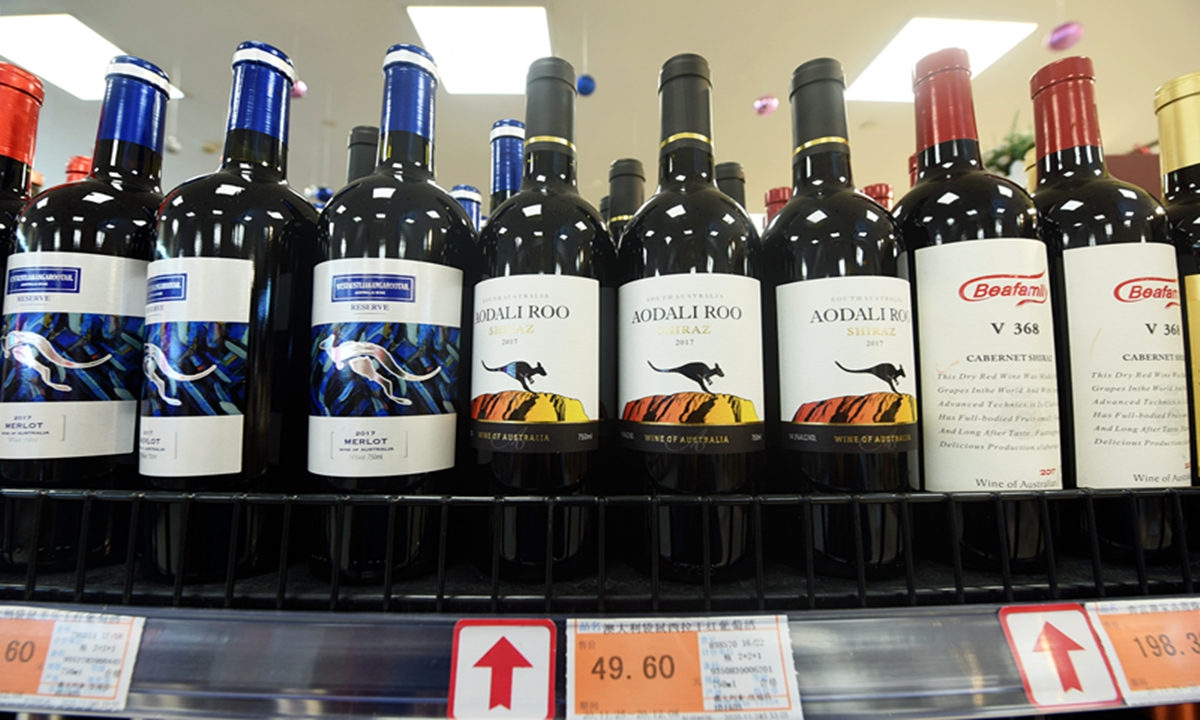
Bottles of Australian wine on the shelf of a supermarket in Hangzhou, East China's Zhejiang Province on November 27, 2020 Photo: VCG
Instead of improving trade ties with China, Australia's Morrison administration is advocating a return to "strategic competition" and proposed a "China-plus" strategy to diversify Australia's export destinations. Experts called the move economically unwise and strategically erratic to the detriment of the wellbeing of the Australian economy.
"Australia is on the frontline of the new strategic competition… Our task is to prepare for and manage this competition. And in this new world, economic resilience is key," Australian Treasurer Josh Frydenberg said on Monday in a speech in Canberra.
He said businesses should redirect their products to new markets in order to reduce reliance on Chinese market, which is "essentially adopting a 'China-plus' strategy."
"Frydenberg's speech is fraught with misidentifications and miscalculations. It parrots [US Secretary of State] Blinken by positioning Australia in a self-perceived engagement in strategic competition with China.
"It claims Australia's economy has performed not badly, even though trade relations with China are in unprecedented disarray," Chen Hong, director of the Australian Studies Center at East China Normal University in Shanghai, told the Global Times on Monday.
There have been no new trade disputes between China and Australia lately. "The treasurer's unprovoked war-cry of a trade severance with China is odd, economically unwise and strategically erratic," Chen said.
Australian relations with China soured after Canberra, following the US blindly, banned Chinese tech giant Huawei from its 5G network rollout in 2018, citing so-called national security concerns. Ties have deteriorated further since the middle of last year after Canberra called for an independent investigation into the origins of COVID-19.
Australian barley and wine exports to China have encountered higher duties since last year, after they were found to have dumped in the Chinese market.
In March, China started to impose anti-dumping duties ranging from 116.2-218.4 percent on Australian wine. According to the ruling, dumping and subsidies have occurred in imported Australian wine, which caused substantial damage to the Chinese wine industry. Since May last year, China began imposing an anti-dumping duty of 73.6 percent and an anti-subsidy duty of 6.9 percent on Australian barley.
"Frydenberg's 'China-plus' strategy is in essence 'China-minus'. He tries to deceive the Australian business community into believing that Australia's economy could sustain [growth] without China. His misleading design to decouple from China is bound to backfire, hurting Australia's own interests," Chen noted.
The Australian economy has benefited substantially from its trade surplus with China over the years, with the latter accounting for over 30 percent of Australia's total trade.
Australia's two-way trade with China edged down 3 percent last year to A$245 billion ($176.97 billion), outperforming a 13 percent decline in Australia's global two-way trade. Its goods and services exports to China fell 6 percent year-on-year to A$159 billion in 2020, data from the Australian Department of Foreign Affairs and Trade showed.
"The Morrison government has picked an unsuitable moment to champion the return of 'strategic competition' when China's trade with other countries is booming. Even China-US trade has shown signs of recovery and sizable growth," said Zhou Fangyin, a professor at the Guangdong Research Institute for International Strategies.
Zhou told the Global Times on Monday that Australia is unable to detect trends in a timely manner.
He added that it is tricky and time-consuming process to diversify export markets, and it is "technically unrealistic to hold hopes that other export destinations will make up for the losses that Australia has suffered in the China market."
Frydenberg stressed the belief that Australian trade and businesses will rebound resiliently without interacting with China, and he intentionally avoided the huge impact and losses at the moment and in future, as China's massive consumer market still has huge room to grow, according to Zhou.
Australia is facing strong economic headwinds resulting from recent Delta variant outbreak across the country. In addition, a huge proportion of Australian exports to China have been going downhill, with tourism and education stalled due to the international travel restrictions. If iron ore is discounted, Australia's trade with China actually has fallen by more than 27 percent.
There has been an increase of government and other public expenditures, and stimulus packages have been made available to sectors of the economy. However, the new short-term economic incentives are not conducive to sustainable development.
Although Australia's June quarter GDP beat expectations, growing by 9.6 percent year-on-year as announced last week, severe lockdowns in the states of Victoria and New South Wales due to the Delta variant are expected to lead to a contraction in the third quarter, observers said.
Chen said that the third and fourth quarters are unquestionably going to be tougher, as iron ore exports to China will be lower, which has not necessarily been reflected in the second-quarter statistics, but will be evident in the coming two quarters.




